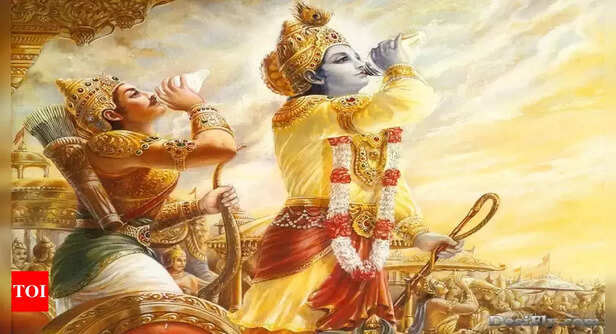The Bhagavad Gita Predicts the Future? The Truth Will Amaze You!
Tarun Badghaiya | Apr 02, 2025, 16:45 IST
krishna
The Bhagavad Gita, an ancient Hindu scripture, provides significant insights about time, human behaviour, and social cycles. Many people believe its teachings foretell the future, warning of moral degradation, consumerism, conflicts, and environmental crises—issues that are still very much relevant today. As we navigate the turbulence of Kali Yuga, the Gita offers hope, implying a change towards spiritual awareness. Whether interpreted as prophesy or eternal wisdom, the lessons on detachment, obligation, and balance remain important. Could the Bhagavad Gita genuinely predict the future, or do its insights reflect universal truths that have been repeated throughout history? This article investigates the exciting possibilities.
The Bhagavad Gita, an ancient Hindu scripture uttered by Lord Krishna to Arjuna on the battlefield at Kurukshetra, is regarded as an eternal guide to life, philosophy, and responsibility. Could it also foretell the future? Many experts and spiritual seekers feel that the Gita's words contain profound insights concerning humanity's fate, the cycles of time, and even contemporary events. Could this religious scripture really prophesy the future? Let's look at some incredible revelations from the Bhagavad Gita that appear to correspond to history and current occurrences.
One of the most intriguing aspects of the Gita is its explanation of time. In contrast to Western thought's linear notion of time, the Gita describes time as cyclical, flowing through recurring ages or Yugas. Hindu cosmology identifies four Yugas:
Satya Yuga (Golden Age): A period of truth, virtue, and justice.
Treta Yuga (Silver Age): A steady moral decay begins.
Dwapara Yuga (Bronze Age) - Values degrade further, resulting in increasing conflict.
Kali Yuga (Iron Age) - A time of darkness, corruption, materialism, and spiritual degradation.
"Whenever there is a decline in righteousness and a rise in unrighteousness, O Arjuna, at that time I manifest Myself on earth."
This passage implies that divine intervention comes when morality fails. Many spiritual leaders believe that we are currently in the Kali Yuga, the most chaotic time period, characterised by deception, greed, and unrest. Could this be a hint that the planet is about to undergo a transformative change?

Several teachings from the Bhagavad Gita appear to correspond with current events, fuelling speculation that it predicted the future.
The Gita warns against excessive attachment to material possessions and urges individuals to seek inner peace through self-realization. In Chapter 16, Verses 8-9, Krishna describes the characteristics of people who disregard spiritual wisdom:
"They say the universe is without truth, without a moral foundation, and without a God. It is the result of mutual union, with lust as the motivator—what else?"
This is disturbingly similar to our materialistic lifestyles, which are dominated by materialism, greed, and immoral behaviour. The pervasive preference for wealth and power over morals could be interpreted as a fulfilment of this prophecy.
The Bhagavad Gita, which was delivered during wartime, offers profound insights on human struggles. In Chapter 2, Verse 47, Krishna tells Arjuna to do his job without regard for the outcome, emphasising the idea that fights, whether personal or global, are unavoidable.
Many see parallels between the Gita’s discourse and the constant wars, political tensions, and unrest in today’s world. The text suggests that wars are often the result of ego, power struggles, and a lack of dharma (righteousness)—a concept that continues to be relevant in international conflicts.

Hindu texts emphasise natural equilibrium, and the Bhagavad Gita, while primarily concerned with human behaviour, obliquely cautions of the implications of natural resource exploitation. In Chapter 3, Verse 14, Krishna explains:
"All living beings subsist on food, food is produced by rain, rain comes from sacrifice, and sacrifice is performed through prescribed duties."
This emphasises the interdependence between nature and human behaviour. The breakdown of this balance—due to deforestation, pollution, and over consumption—has resulted in major climate disasters. Some argue that the environmental difficulties we face now are consistent with the Gita's warnings about ignoring holy duties (dharma) to nature.
Despite the instability of Kali Yuga, the Bhagavad Gita provides hope, implying that spiritual enlightenment will occur in the midst of conflict. People are increasingly turning to meditation, yoga, and ancient wisdom to achieve tranquilly. The emergence of global spirituality, mindfulness, and a search for deeper meaning may signal that humanity is poised for a shift—perhaps even the start of a new period beyond the Kali Yuga.

1. Even if one does not believe in the Gita's ability to predict the future, its teachings provide important insights on how to overcome contemporary issues.
2. Detach from Materialism: The quest of wealth is fleeting; true happiness is found in self-awareness.
3. Act with Purpose: Concentrate on your karma (actions) instead of worrying about the outcome.
4. Seek Balance: Strive for balance between personal ambition and ethical obligations.
5. Embrace Change: Life is continuously changing—adaptation and resilience are essential.
6. Cultivate Spiritual Awareness: Meditation, self-reflection, and dedication can help you cope with uncertainty.
The Bhagavad Gita may not expressly foresee specific future events, but its profound wisdom does provide a framework for comprehending time cycles, human behaviour, and society changes. Whether seen as a spiritual guide or a philosophical masterpiece, its historical significance cannot be overstated.
As we see increased global unrest, environmental disasters, and a resurgent desire for purpose, the Bhagavad Gita's lessons provide both warnings and remedies. Perhaps its most powerful prophecy is not of impending doom, but of the possibility of transformation—urging humanity to rise beyond ignorance and embrace greater consciousness.
What do you think? Are we living out the predictions of the Gita, or are they simply universal truths that have been repeated throughout history? Please share your ideas.
Explore the latest trends and tips in Health and Fitness, , Travel, Life Hacks, Fashion & Beauty, and Relationships at Times Life
The Meaning of Time in the Bhagavad Gita
Satya Yuga (Golden Age): A period of truth, virtue, and justice.
Treta Yuga (Silver Age): A steady moral decay begins.
Dwapara Yuga (Bronze Age) - Values degrade further, resulting in increasing conflict.
Kali Yuga (Iron Age) - A time of darkness, corruption, materialism, and spiritual degradation.
The Bhagavad Gita (Chapter 4, Verse 7) declares that
This passage implies that divine intervention comes when morality fails. Many spiritual leaders believe that we are currently in the Kali Yuga, the most chaotic time period, characterised by deception, greed, and unrest. Could this be a hint that the planet is about to undergo a transformative change?

krishan and arjuna.
Predictions from the Bhagavad Gita and current events
1. The Rise of Materialism and Moral Decline
"They say the universe is without truth, without a moral foundation, and without a God. It is the result of mutual union, with lust as the motivator—what else?"
This is disturbingly similar to our materialistic lifestyles, which are dominated by materialism, greed, and immoral behaviour. The pervasive preference for wealth and power over morals could be interpreted as a fulfilment of this prophecy.
2. Conflicts & Wars around the World
Many see parallels between the Gita’s discourse and the constant wars, political tensions, and unrest in today’s world. The text suggests that wars are often the result of ego, power struggles, and a lack of dharma (righteousness)—a concept that continues to be relevant in international conflicts.

krishna
3. Climate Change and Ecological Destruction
"All living beings subsist on food, food is produced by rain, rain comes from sacrifice, and sacrifice is performed through prescribed duties."
This emphasises the interdependence between nature and human behaviour. The breakdown of this balance—due to deforestation, pollution, and over consumption—has resulted in major climate disasters. Some argue that the environmental difficulties we face now are consistent with the Gita's warnings about ignoring holy duties (dharma) to nature.
4. The Transition To Spiritual Awakening

krishna
What Can We Learn from the Bhagavad Gita Now?
1. Even if one does not believe in the Gita's ability to predict the future, its teachings provide important insights on how to overcome contemporary issues.
2. Detach from Materialism: The quest of wealth is fleeting; true happiness is found in self-awareness.
3. Act with Purpose: Concentrate on your karma (actions) instead of worrying about the outcome.
4. Seek Balance: Strive for balance between personal ambition and ethical obligations.
5. Embrace Change: Life is continuously changing—adaptation and resilience are essential.
6. Cultivate Spiritual Awareness: Meditation, self-reflection, and dedication can help you cope with uncertainty.
The Bhagavad Gita may not expressly foresee specific future events, but its profound wisdom does provide a framework for comprehending time cycles, human behaviour, and society changes. Whether seen as a spiritual guide or a philosophical masterpiece, its historical significance cannot be overstated.
As we see increased global unrest, environmental disasters, and a resurgent desire for purpose, the Bhagavad Gita's lessons provide both warnings and remedies. Perhaps its most powerful prophecy is not of impending doom, but of the possibility of transformation—urging humanity to rise beyond ignorance and embrace greater consciousness.
What do you think? Are we living out the predictions of the Gita, or are they simply universal truths that have been repeated throughout history? Please share your ideas.
Explore the latest trends and tips in Health and Fitness, , Travel, Life Hacks, Fashion & Beauty, and Relationships at Times Life
